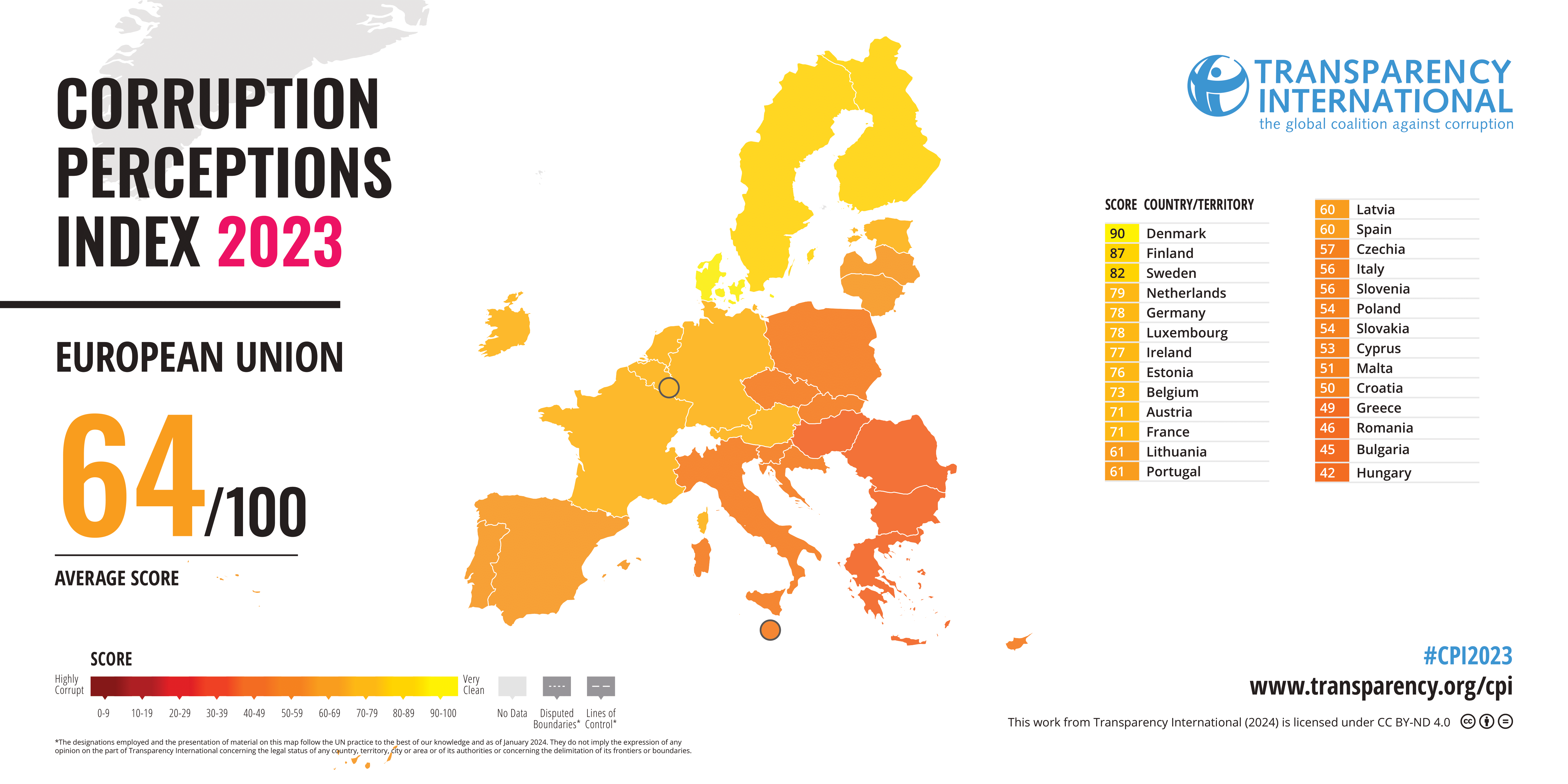Berlin, 30 January 2023 – The 2023 Corruption Perception Index (CPI) released today by Transparency International shows that most of the world continues to fail to fight corruption: 95 per cent of countries have made little to no progress since 2017.
Quote from CEO of Transparency International, Daniel Eriksson:
“Corruption worsens social injustice and disproportionately affects the most vulnerable. In many countries, obstacles to justice for victims of corruption persist. It is time to break the barriers and ensure people can access justice effectively. Everyone deserves fair and inclusive legal systems where victims’ voices are heard at every stage. Anything else is an affront to justice.”
BELGIUM’S SCORE HIGHLIGHTS A NEED FOR ACTION BY THE BELGIAN GOVERNMENT
A summary of the main results:
- 62% of Belgian civilians believes that corruption is widespread;
- Belgium continues its low score in 2023 (73/100);
- 95 per cent of countries have made little to no progress since 2017.
Transparency International Belgium is eager to highlight the results of the Corruption Perception Index 2023 (‘CPI’) which reveals that despite concerted efforts and many hard-won gains in Belgium, we cannot take progress against corruption for granted.
Belgium continues its low score in 2023 (73/100) which as the same as previous two years. The stagnation is still a lower score in comparison to 2020 (76/100). This results in the fact that Belgium’s place continues to reach its lowest score ever since the beginning of score-keeping in 1995.
According to Special Eurobarometer research on Corruption done by the European Commission for its yearly Rule of Law report on Belgium, 62% of the general Belgian public still believes that corruption in the country is widespread. For this reason, TI Belgium does not consider the response of the public authorities as adequate in terms of urgency.
Belgium’s stagnation is a cautionary tale about countries’ complacency, which is detrimental not only to global anti-corruption efforts but also their own affairs. Even when corruption is on the agenda, there is a certain complacency. Corruption is seen as an issue elsewhere, but not a major problem at home. What is conveniently forgotten is that corruption is insidious.
Qatargate has shown corruption is alive and is affecting large institutions in Belgium, such as the European Parliament. Positively, law enforcement showed teeth in their investigations into bribery of current and former Members of the European Parliament and their staff by foreign actors. The scandal has demonstrated the importance of having committed public institutions in the fight against corruption. TI Belgium thus continues to support and advocate for independent and strengthened judiciary in Belgium in the fight against corruption. There is also need for more public resources to effectively investigate corruption cases.
There is no doubt that Qatargate has dealt a serious blow to the public’s confidence in the public authorities, both locally and within Europe.
TI Belgium therefore believes that there is a need for the Belgian authorities to take action that would lead to positive and concrete results in the fight against corruption. Belgium continues to accumulate negative reviews from several international organisations, such as GRECO and OECD, for its legislative inaction and the lack of resources made available to fight local and international corruption.
Finally, 2023 was the year of the transposition of the Whistleblowing Directive into Belgian law which has become and will continue to be an important framework in the fight against corruption in Europe. However, in practice, there is still room for improvement to better protect whistleblowers against retaliatory actions taken by employers or institution on which they would like to blow the whistle.
Quote from Transparency International Belgium Chairman, Dominique Dussard:
“In Belgium, where the port of Antwerp battles the infiltration of drugs and the echoes of Qatargate are still strongly felt, it becomes imperative, now more than ever, that there is an urgency for the Belgian authorities to take corruption issues at the heart of its policies. Only through unwavering commitment to transparency and accountability can we safeguard our society. Transparency International Belgium therefore urges the Belgian authorities to put this issue to the front of its attention.”
GLOBAL HIGHLIGHTS
The Corruption Perceptions Index (CPI) released by Transparency International reveals that most countries have made little to no progress in tackling public sector corruption in more than a decade. What is more, over two-thirds of countries score below 50 out of 100, which strongly indicates serious corruption problems.
Governments are largely failing to stop corruption – over 80 per cent of the world’s population lives in countries with CPI scores below the global average of 43.
The global trend of weakening justice systems is reducing accountability for public officials, which allows corruption to thrive. Authoritarian and also many democratic leaders undermining justice are increasing impunity for corruption, and even encouraging it by eliminating consequences for criminals.
When bribery and political interference infiltrate the justice sector, this can lead to the manipulation of legal processes, selective enforcement of the law and the shielding of perpetrators from accountability. This benefits a small number of wrongdoers at the expense of the common good.
To end impunity for corruption, governments must give justice systems the independence, resources and transparency needed to effectively punish all corruption offences and provide checks and balances on power. Where necessary, they must also introduce better procedures and laws to help justice institutions shield themselves from and target corrupt acts.
Quote from Transparency International Chairman, François Valérian:
“Corruption will continue to thrive until justice systems can punish wrongdoing and keep governments in check. When justice is bought or politically interfered with, it is the people that suffer. Leaders should fully invest in and guarantee the independence of institutions that uphold the law and tackle corruption. It is time to end impunity for corruption.”
ABOUT THE CORRUPTION PERCEPTIONS INDEX
Since its inception in 1995, the Corruption Perceptions Index has become the leading global indicator of public sector corruption. The index scores 180 countries and territories around the world based on perceptions of public sector corruption, using data from 13 external sources, including the World Bank, World Economic Forum, private risk and consulting companies, think tanks and others. The scores reflect the views of experts and business people.
The process for calculating the CPI is regularly reviewed to make sure it is as robust and coherent as possible, most recently by the European Commission’s Joint Research Centre in 2017. All the CPI scores since 2012 are comparable from one year to the next. For more information, see this article: The ABCs of the CPI: How the Corruption Perceptions Index is calculated.
The CPI scores 180 countries and territories around the world based on perceptions of public sector corruption. The scores reflect the views of experts and surveys from businesspeople, not the public. (See methodology video.)
The CPI is calculated using data from 13 external sources, including the World Bank, World Economic Forum, private risk and consulting companies, think tanks and others.
The CPI uses a scale from 0 to 100; 100 is very clean and 0 is highly corrupt.
Types of public sector corruption captured in the CPI encompass bribery, diversion of public funds, effective prosecution of corruption cases, adequate legal frameworks, access to information, and legal protections for whistleblowers, journalists and investigators.
The CPI does not measure activities such as tax fraud, money laundering, financial secrecy, illicit flows of dirty money or other forms of private sector corruption.
INTERVIEW REQUESTS
In case of country-specific queries, please contact Transparency International’s national chapters.
For queries in Belgium (NL/ENG): thomas.vermaerke@transparencybelgium.be
For queries in Belgium (FR): Dominique.dussard@transparencybelgium.be
In case of queries around regional and global findings, please contact the Transparency International Secretariat: press@transparency.org.





